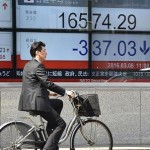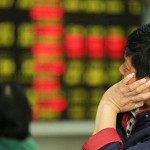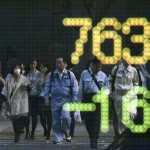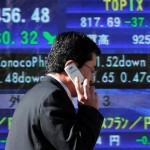Asian Stocks Advance as Oil Holds Near $40; Aussie, Kiwi Climb
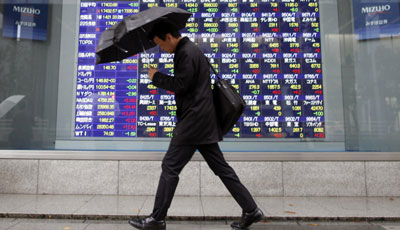
-
Korean won climbs to five-month high as gold declines
-
Japan’s Topix jumps by most in a month as yen weakens
Asian equities jumped by the most in a month as crude oil stayed within sight of $40 a barrel, supporting the currencies of resource-exporting nations. The Australian and New Zealand dollars advanced to their strongest levels since June, while the yen weakened.
The MSCI Asia Pacific Index climbed to a four-month high as Japan’s Topix surged 3 percent. Futures on the Dow Jones Industrial Average declined after the gauge ended above the 18,000 level for the first time since July. A labor strike in Kuwait supported the price of crude, which sank below $38 in early trading on Monday after major producers failed to reach agreement on a proposed output freeze. South Korea’s won climbed to a five-month high as the central bank refrained from loosening monetary policy.

The oil market is showing signs of stability after a Monday plunge that was reminiscent of early January, when concern about China’s economic health spurred a $7 trillion selloff in global equities. Shares rebounded with oil over the past two months as data pointed to a stabilization of Chinese growth and U.S. companies reported better-than-expected earnings. Boston Fed President Eric Rosengren said Monday that he and many private-sector economists envision a “much healthier U.S. economy” than implied by markets.
“There appears to be less skepticism, with investors shrugging off oil’s losses overnight,” said Michael McCarthy, chief market strategist at CMC Markets in Sydney. “Pessimism in analysts’ expectations in the lead-up to the U.S. earnings season appears overdone. There’s room for an upward surprise.”
Morgan Stanley and Hasbro Inc. reported first-quarter profits on Monday that exceeded analysts’ estimates, while companies including Goldman Sachs Group Inc., Johnson & Johnson and Yahoo! Inc. are scheduled to release results on Tuesday. About three-quarters of the 43 companies in the Standard & Poor’s 500 Index that have reported so far beat projections, according to data compiled by Bloomberg.
While acknowledging a slowdown in the first quarter, the Boston Fed’s Rosengren said he expected growth in the U.S. to pick up in the second quarter and employers to continue adding jobs. He’s a voter on the policy-setting Federal Open Market Committee, which is scheduled to gather in Washington on April 26-27 to set the benchmark federal funds rate. South Korea’s central bank kept its key rate at 1.5 percent on Tuesday, a decision forecast by 17 of 20 analysts surveyed by Bloomberg.
Stocks
The MSCI Asia Pacific Index rose 1.4 percent as of 12:43 p.m. Tokyo time. All 30 industry groups on the Topix were higher, led by a 5.7 percent surge in banking stocks. The benchmark slid 3.7 percent in the last two days after the country’s biggest earthquake in five years disrupted output at companies including Sony Corp. and Toyota Motor Corp.
“The concerns we had yesterday were perhaps too extreme and didn’t spread to U.S. markets, which is leading to a sense of relief as oil prices recovered at the bottom,” said Toshihiko Matsuno, chief strategist at SMBC Friend Securities Co. in Tokyo. “We now have concerns that the economic impact from the Kumamoto earthquake could become larger, which is leading to expectations of further easing from the Bank of Japan.”
Australia’s S&P/ASX 200 Index added 1 percent, led by a 5.1 percent surge in BHP Billiton Ltd., the world’s biggest miner. The Hang Seng Index rose 0.5 percent, while the Shanghai Composite Index was little changed. Prudence will feature more prominently in China’s monetary policy than last year, while a certain degree of looseness will be maintained, the Xinhua News Agency said in a commentary on Monday.
China Unicom (Hong Kong) Ltd., the nation’s second-largest phone carrier, fell to a one-month low. The company said Monday that first-quarter net income probably plunged about 85 percent to 480 million yuan ($74.1 million), which would be the lowest since it posted a loss in the final quarter of 2011. Larger rival China Mobile Ltd. fell for the first time in six days.
Futures on the Dow Jones Industrial Average fell 0.2 percent, while contracts on the S&P 500 Index were steady.
Currencies
New Zealand’s dollar climbed as much as 0.8 percent to 70.05 U.S. cents and Australia’s currency rallied as much as 0.4 percent to 77.84 U.S. cents. Australia’s central bank said Tuesday “very accommodative” policy is appropriate given low inflation and reiterated concern that the local dollar’s strength could complicate the economy’s rebalancing away from mining. The comments were contained in the minutes of its April 5 policy meeting.
South Korea’s won rose 1.1 percent as the Bank of Korea held its benchmark rate at a record low for a 10th consecutive month, saying consumption and economic sentiment appear to be improving. Even so, the monetary authority cut its 2016 economic growth forecast to 2.8 percent from 3 percent and Governor Lee Ju Yeol said monetary policy will remain accommodative.
Malaysia’s ringgit was set for its biggest gain of the month as crude’s rebound from Monday’s low bolstered prospects for Malaysia, Asia’s only major net oil exporter.
The euro rose 0.1 percent, after climbing 0.3 percent on Monday amid speculation the European Central Bank will refrain from further monetary easing at an April 21 policy meeting. The yen weakened 0.2 percent to 109.06 a dollar, extending its retreat from a 17-month high of 107.63 reached last week.
Commodities
Crude oil fell 0.3 percent to $39.68 a barrel in New York, after sliding as much as 6.8 percent on Monday following the Doha talks. A labor strike that started Sunday in Kuwait reduced the nation’s output by 60 percent to 1.1 million barrels a day.
Copper declined 0.4 percent in London, while nickel dropped 2 percent. Zinc retreated from its highest close in more than eight months, having rallied of late as stockpiles dwindled to their lowest since 2009.
Bonds
U.S. Treasuries declined, pushing the 10-year yield up by one basis point to 1.78 percent. BlackRock Inc. said Monday it expects losses for long-dated U.S. government securities and euro-zone debt over the next half decade as high bond prices and low interest rates limit returns.
The yield on similar-maturity bonds in Australia climbed six basis points to 2.55 percent, near this month’s high.
1Malaysia Development Bhd.’s dollar bonds due March 2023 rose 5.3 percent, having plunged 13 percent on Monday after an Abu Dhabi sovereign wealth fund said the Malaysian state-owned investment company failed to make a payment of more than $1 billion. Malaysia’s finance ministry said in a statement that it “will continue to honor all of its outstanding commitments.”
The cost of insuring corporate and sovereign bonds in the Asia-Pacific region declined for a second day. The Markit iTraxx Asia index of credit-default swaps fell two basis points to 138 basis points, according to prices from Australia & New Zealand Banking Group Ltd.
Source: Bloomberg










